Small overlap front
The small overlap front evaluation consists of a driver-side and a passenger-side component. This vehicle has an incomplete rating because it has been tested only on one side.
Driver-side
- Rating applies to 2014-24 models
Tested vehicle: 2014 Mini Cooper 2-door
The Mini Cooper was redesigned for the 2014 model year.
| Evaluation criteria | Rating |
|---|---|
| Overall driver-side evaluation | |
| Structure and safety cage | |
| Driver injury measures | |
| Head/neck | |
| Chest | |
| Hip/thigh | |
| Lower leg/foot | |
| Driver restraints and dummy kinematics | |
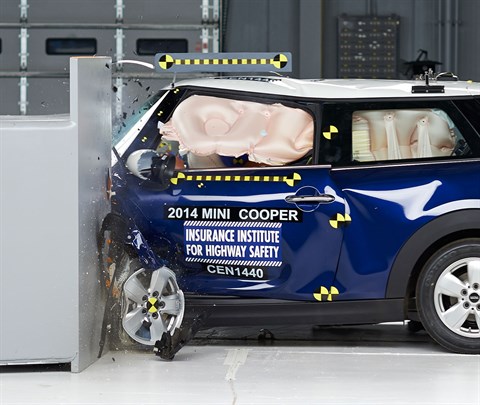
Action shot taken during the small overlap frontal crash test.
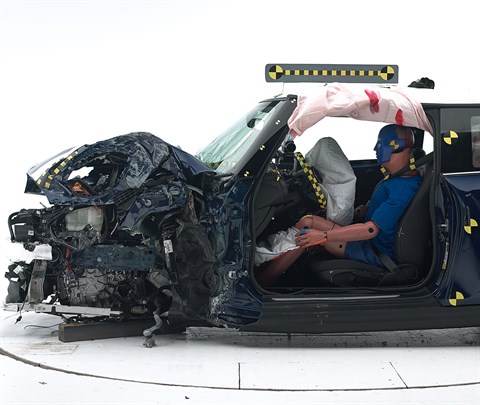
The dummy's position in relation to the door frame, steering wheel, and instrument panel after the crash test indicates that the driver's survival space was maintained very well.
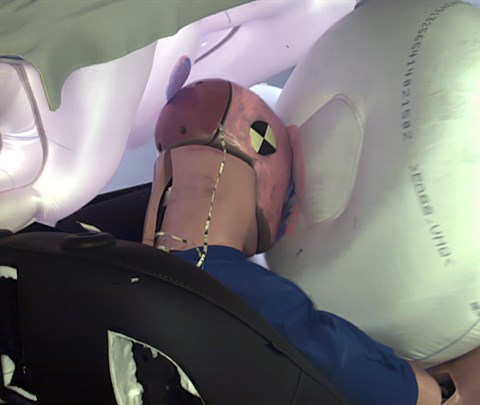
The frontal and side curtain airbags worked well together to keep the head from coming close to any stiff structure or outside objects that could cause injury.
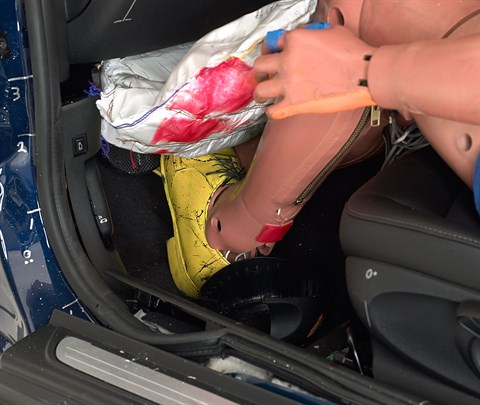
The driver's space was maintained well, and risk of injuries to the dummy's legs and feet was low.
Moderate overlap front: original test
Rating applies to 2014-24 models
Tested vehicle: 2014 Mini Cooper 2-door
The Mini Cooper was redesigned for the 2014 model year. Moderate overlap frontal ratings are assigned by the Institute based on a test conducted by BMW (manufacturer of the Mini).
| Evaluation criteria | Rating |
|---|---|
| Overall evaluation | |
| Structure and safety cage | |
| Driver injury measures | |
| Head/neck | |
| Chest | |
| Leg/foot, left | |
| Leg/foot, right | |
| Driver restraints and dummy kinematics | |
Side: original test
Rating applies to 2016-24 models built after November 2015
Tested vehicle: 2016 Mini Cooper 2-door
The Mini Cooper was redesigned for the 2014 model year. Beginning with 2016 models built after November 2015, the side curtain airbags were modified to improve rear seat occupant protection in side impact crashes. (Information about when a specific vehicle was manufactured is on the certification label typically affixed to the car on the driver door or adjacent B-pillar.)
| Evaluation criteria | Rating |
|---|---|
| Overall evaluation | |
| Structure and safety cage | |
| Driver injury measures | |
| Head/neck | |
| Torso | |
| Pelvis/leg | |
| Driver head protection | |
| Rear passenger injury measures | |
| Head/neck | |
| Torso | |
| Pelvis/leg | |
| Rear passenger head protection | |
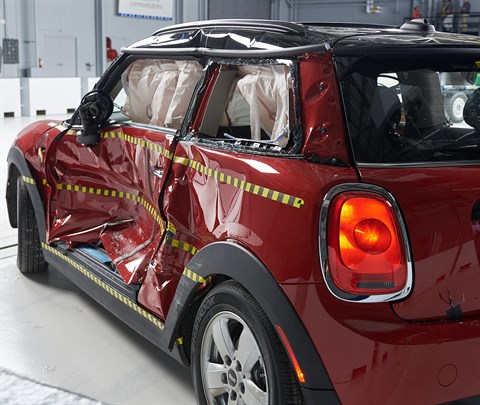
View of the vehicle just after the crash test.
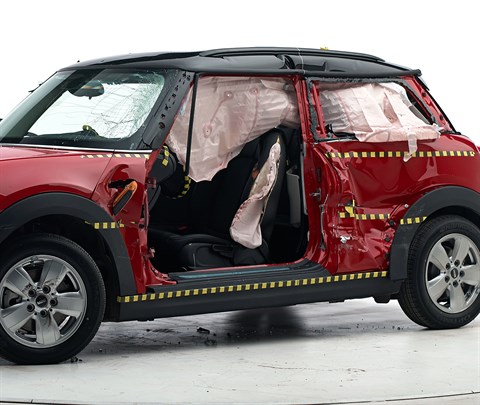
View of the vehicle after the crash with door removed, showing the side airbags and damage to the occupant compartment.
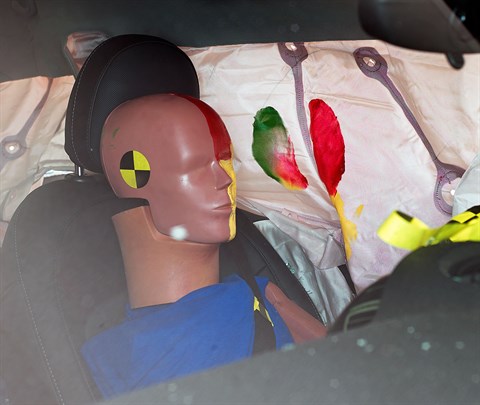
Smeared greasepaint shows where the driver dummy's head was protected from being hit by hard structures by the side airbags.
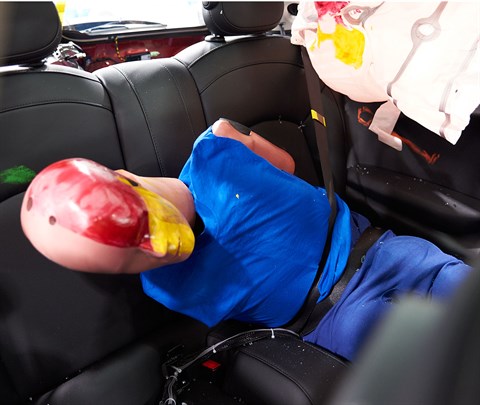
Smeared red and yellow greasepaint shows where the rear passenger dummy’s head was protected by the side airbag. During rebound, the dummy's head and torso slid out from the shoulder belt and moved across the seat, but this motion does not cause any significant risk of injury.
Headlights
Trim level(s)
- All trims
| Evaluation criteria | Rating |
|---|---|
| Low-beam headlight type | LED projector |
| High-beam headlight type | LED projector |
| Curve-adaptive? | Yes |
| High-beam assist? | Yes |
|
Overall rating | |
| Distance at which headlights provide at least 5 lux illumination: | |
Low beams
On the straightaway, visibility was good on both sides of the road. On curves, visibility was good on the sharp left and both right curves and fair on the gradual left curve.
The low beams created some glare.
High beams
On the straightaway, visibility was inadequate on both sides of the road. On curves, visibility was fair in all 4 tests.
High-beam assist compensates for some limitations of this vehicle's low beams on the straightaway, on both left curves and on the sharp right curve.
Child seat anchors
Rating applies to 2015-24 models
| Evaluation criteria | Rating |
|---|---|
| Overall evaluation | |
| Vehicle trim | Hardtop |
| Seat type | leather |
This vehicle has 2 rear seating positions with complete child seat attachment (LATCH) hardware.
| Evaluation criteria | Rating |
|---|---|
| Overall evaluation | |
| Vehicle trim | Hardtop |
| Seat type | leather |
| Rating icon | Rating |
|---|---|
| G | Good |
| A | Acceptable |
| M | Marginal |
| P | Poor |
| Seating positions that rely on borrowed lower anchors or have only a tether anchor available are not rated. | |
thether anchor symbol | Tether anchor |
lower anchor symbol | Lower anchors |
| Lower anchor(s) can be borrowed from adjacent positions(s) | |
| No hardware available |
Details by seating position
| Position | Rating |
|---|---|
| 1 | |
| Tether anchor | |
| easy-to-find location | |
| no other hardware could be confused for anchor | |
| Lower anchors | |
| too deep in seat | |
| not too much force needed to attach | |
| difficult to maneuver around anchors | |
| 3 | |
| Tether anchor | |
| easy-to-find location | |
| no other hardware could be confused for anchor | |
| Lower anchors | |
| too deep in seat | |
| not too much force needed to attach | |
| difficult to maneuver around anchors |
